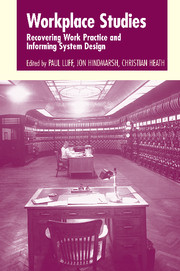Book contents
- Frontmatter
- Contents
- List of contributors
- List of figures
- Preface
- 1 Introduction
- Part 1 Exploring the workplace
- 2 Making a case: ‘knowledge’ and ‘routine’ work in document production
- 3 Design by problem-solving
- 4 Analysing cooperative work in an urban traffic control room for the design of a coordination support system
- 5 Expert systems in (inter)action: diagnosing document machine problems over the telephone
- 6 The critical role of workplace studies in CSCW
- 7 From individual action to collective activity and back: developmental work research as an interventionist methodology
- Part 2 The interface between research and design
- Bibliography
- Index
2 - Making a case: ‘knowledge’ and ‘routine’ work in document production
Published online by Cambridge University Press: 05 May 2010
- Frontmatter
- Contents
- List of contributors
- List of figures
- Preface
- 1 Introduction
- Part 1 Exploring the workplace
- 2 Making a case: ‘knowledge’ and ‘routine’ work in document production
- 3 Design by problem-solving
- 4 Analysing cooperative work in an urban traffic control room for the design of a coordination support system
- 5 Expert systems in (inter)action: diagnosing document machine problems over the telephone
- 6 The critical role of workplace studies in CSCW
- 7 From individual action to collective activity and back: developmental work research as an interventionist methodology
- Part 2 The interface between research and design
- Bibliography
- Index
Summary
Introduction
Discursive practices are used by members of a profession to shape events in the domains subject to their professional scrutiny. The shaping process creates the objects of knowledge that become the insignia of a profession's craft: the theories, artifacts and bodies of expertise that distinguish it from other professions. Analysis of the methods used by members of a community to build and contest the events that structure their lifeworld contributes to the development of a practice-based theory of knowledge and action.
(C. Goodwin, 1994:606)The emergence of ‘information’ as the dominant commodity of the late twentieth century has brought with it an accompanying preoccupation with ‘knowledge work’ as the defining form of labour. At least implicitly, knowledge work stands always in contrast with certain other, persistent forms of work that are taken not to involve the active production and use of information. These latter may be either the residue of so-called ‘manual’ labour, or mediating processes in the operation of information technologies that remain to be automated, still requiring human interventions but otherwise defined as routine (data input being the prototypical case).
A starting concern of this chapter is how, in reproducing oppositions of mental versus manual, the discourse of knowledge versus routine work sustains old assumptions as a basis for conceptualising new relations of work and technology. Developing an alternative to these traditional conceptualisations requires that we re-examine the basic premises about knowledge on which they rest. One by now common-sense premise is that professionalised forms of labour have grown up around particular bodies of specialist knowledge, held, maintained and developed by profession members.
- Type
- Chapter
- Information
- Workplace StudiesRecovering Work Practice and Informing System Design, pp. 29 - 45Publisher: Cambridge University PressPrint publication year: 2000
- 47
- Cited by

